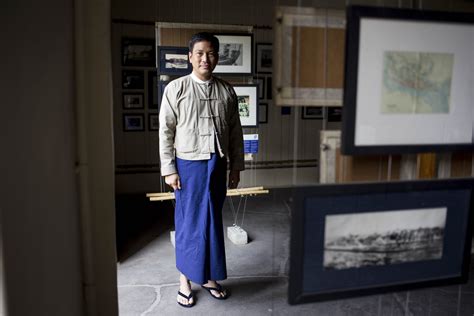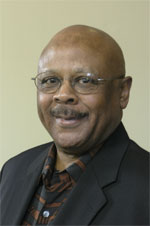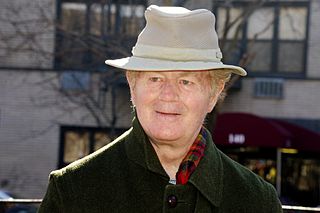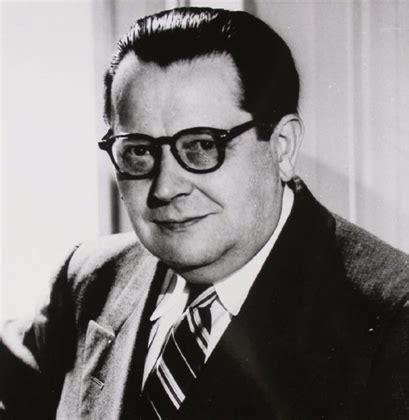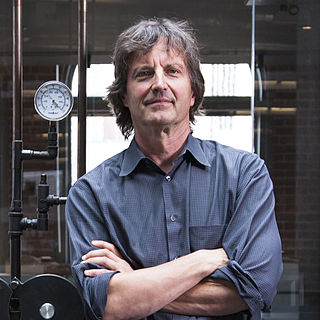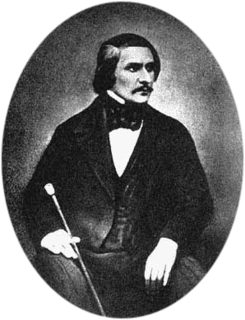Top 774 Remote Quotes & Sayings - Page 12
Explore popular Remote quotes.
Last updated on December 22, 2024.
About the book of Job: If it were today, God might be asking "How does DNA carry traits? How are instincts passed on in animals? How does consciousness arise in the human body and brain, and what is consciousness? What is dark matter? How did the big bang happen? Why does the speed of light appear to be absolute? Is cold fusion possible? How do you program a TV remote control?
Hitherto without being; hidden away in the womb of eternity; possessed neither of thought nor feeling; remote from the range of human ken -- the Man bursts, in some unknown manner, the bars of non-existence, and announces with a cry the beginning of his brief life. In the night of non-existence there bursts forth also a little candle, lit by an unseen hand. Mark well its flame: for it is the life of that Man.
Louis [Leakey] was anxious to initiate a scientific study of these chimpanzees. It would be difficult, he emphasized, for nothing was known; there were no guidelines for such a field study; and the habitat was remote and rugged. Dangerous wild animals would be living there, and chimpanzees themselves were considered at least four times stronger than humans. I remember wondering what kind of scientist he would find for such a herculean task.
There isn't much to say about my childhood. I remember explosions of intense happiness, followed shortly afterwards by profound melancholy that always prompted remarks and comments from those around me on how remote my life was from my age. Therefore I rapidly lost all my respect for age. From then on, I always lived without any age, given that every year I used to repudiate it, choosing another one for the sole good reason that I liked it better.
By turns sad and uplifting, Life in the Valley of Death tells the amazing tale of Alan Rabinowitz's courageous and spirited efforts to protect Burma's (Myanmar's) remaining tigers and establish the Hukawng Valley Reserve. It is hard to imagine a more passionate or exciting account of today's conservation challenges, or a more thoughtful rendering of life, death, and politics in Burma's most remote corners.
We live in an inter-dependent world. An isolated India is not in our interest. Just because we are a large country, we cannot be arrogant and think that we can ignore others. We live in a different era. Terrorism is global and can come from even remote countries. International summits and organizations like WTO take decisions which will bind us and if we are not present in such summits, we may be hurt by the decisions taken.
Europe has a set of primary interests, which to us have none, or a very remote relation. Hence she must be engaged in frequent controversies, the causes of which are essentially foreign to our concerns. Hence, therefore, it must be unwise in us to implicate ourselves, by artificial ties, in the ordinary vicissitudes of her politics or the ordinary combinations and collisions of her friendships or enmities.
Our growing ability to eliminate the slow-moving aspects of entertainment and go hopping from one peak to another is not without cost. Stand-up comics, movie-makers and others who earn their living entertaining no longer "waste" time with setups and plot development, lest we reach for the remote and click them off our screen. The result is a loss of subtlety, anticipation and nuance and, in the process, a coarsening of our discourse.
It is a key fact about American policy in Vietnam that the withdrawel of American troops was built into it from the start. None of the presidents who waged war in Vietnam contemplated an open-ended campaign; all promised the public that American troops would be able to leave in the not-too-remote future. The promise of withdrawel precluded a policy of occupation of the traditional colonial sort, in which a great power simply imposes its will on a small one indefinitely.
The gospel is unintelligible to most people today, especially in the West, because their own particular stories are remote from the story of creation, fall, redemption, and consummation that is narrated in the Bible. Our focus is introspective and narrow, confided to our own immediate knowledge, experience, and intuition. Trying desperately to get others, including God, to make us happy, we cannot seem to catch a glimpse of the real story that gives us a meaningful role.
An American has invented a remote control that will turn off any telly within a 20ft radius. What a marvellous device! What a splendid invention! What a really helpful and improving way of devoting your time to building something that turns off culture. Next week, I'm instigating Burn a Book Week, to encourage even more conversation. I've come up with a fantastic little device which I'll call a box of matches.
He who travels much has this advantage over others – that the things he remembers soon become remote, so that in a short time they acquire the vague and poetical quality which is only given to other things by time. He who has not traveled at all has this disadvantage – that all his memories are of things present somewhere, since the places with which all his memories are concerned are present.
This is crossing the Rubicon, after which there will be no more sovereign states in Europe with fully-fledged governments and parliaments which represent legitimate interests of their citizens, but only one State will remain. Basic things will be decided by a remote 'federal government' in Brussels and, for example, Czech citizens will be only a tiny particle whose voice and influence will be almost zero. ... We are against a European superstate.
... the United States, for generations, has sustained two parallel but opposed states of mind about military atrocities and human rights: one of U.S. benevolence, generally held by the public, and the other of ends-justify-the-means brutality sponsored by counterinsurgency specialists. Normally the specialists carry out their actions in remote locations with little notice in the national press. That allows the public to sustain its faith in a just America, while hard-nosed security and economic interests are still protected in secret.
Do you know where Jason is?” she asked Dmitri when they exited the morgue. Dmitri pressed the car remote to unlock the flame red Ferrari parked in the employees-only lot. “Tired of your Bluebell already?” A tendril of champagne circled around her senses, cut with something far harder. Never had she felt that harsh edge in Dmitri’s scent. She pitied the woman he took to his bed today. “Yeah, that’s it. I’m building a harem.
I love these appeals to the "complexity of doing business in Alaska." If you want to live in remote villages or places with hostile weather and environment, that's certainly your right. But why is it you please continue to expect that the rest of us are responsible for making that economically feasible. You already get a big boost from oil and other natural resources. If that's not enough to pay for the infrastructure you say you need, maybe you should consider moving down here. No passport or work visa is required.
I didn't want to be driving to work everyday and sending out my Starbucks order. I didn't want to be in New York or L.A. I wanted to have space and I wanted to be in a remote place where all of us could just be ourselves and not worry about anyone trying to listen in or get in on that. I wanted to just be comfortable. I feel like being in a big city - as much as I find New York, in particular, very inspiring in a lot of ways - can also be claustrophobic.
Whenever I start thinking of my love for a person, I am in the habit of immediately drawing radii from my love - from my heart, from the tender nucleus of a personal matter- to monstrously remote points of the universe. Something impels me to measure the consciousness of my love against such unimaginable and incalculable things as the behaviour of nebulae (whose very remoteness seems a form of insanity), the dreadful pitfalls of eternity, the unknowledgeable beyond the unknown, the helplessness, the cold, the sickening involutions and interpenetrations of space and time.
A reader's tastes are peculiar. Choosing books to read is like making your way down a remote and winding path. Your stops on that path are always idiosyncratic. One book leads to another and another the way one thought leads to another and another. My type of reader is the sort who burrows through the stacks in the bookstore or the library (or the Web site — stacks are stacks), yielding to impulse and instinct.
Religion is the vision of something which stands beyond, behind, and within, the passing flux of immediate things; something which is real, and yet waiting to be realised; something which is a remote possibility, and yet the greatest of present facts; something that gives meaning to all that passes, and yet eludes apprehension; something whose possession is the final good, and yet is beyond all reach; something which is the ultimate ideal, and the hopeless quest.
There is not any haunt of prophecy,
Nor any old chimera of the grave,
Neither the golden underground, nor isle
Melodious, where spirits gat them home,
Nor visionary south, nor cloudy palm
Remote on heaven's hill, that has endured
As April's green endures; or will endure
Like her remembrance of awakened birds,
Or her desire for June and evening, tipped
By the consummation of the swallow's wings.
My suspicion is that those who seem oblivious to suffering, whether it is nearby or in remote corners, are for the most part unaware, perhaps blinded by doctrine and ideology. For them, the answer is to develop a critical attitude toward articles of faith, secular or religious; to encourage their capacity to question, to explore, to view the world from the standpoint of others. And direct exposure is never very far away, wherever we live - perhaps the homeless person huddling in the cold or asking for a few pennies for food, or all too many more.
So the absurdity of happiness is that it is embarrassing to discuss or even mention, impossible to define or measure, may not be achievable at all - or, at best, only intermittently and unconsciously - and may even turn into its opposite if directly pursued, but that it frequently turns up unexpectedly in the course of pursuing something else. There is no tease more infuriating...It is tempting to forget the whole thing and simply fall back on the couch with a remote control in one hand and a beer in the other.
Thus even supposedly unadulterated facts of observation already are interfused with all sorts of conceptual pictures, model concepts, theories or whatever expression you choose. The choice is not whether to remain in the field of data or to theorize; the choice is only between models that are more or less abstract, generalized, near or more remote from direct observation, more or less suitable to represent observed phenomena.
If you look at the well-informed Democratic Sanders activists - I don't know if you were in Philadelphia, but there was no secret about their enthusiasm for our campaign. But once you got more remote from the super activists in the Bernie [Sanders] camp, they don't know so much about our campaign. And the question is whether they are going to have a chance to be informed.
I have come to believe ... that the stage may do more than teach, that much of our current moral instruction will not endure the test of being cast into a lifelike mold, and when presented in dramatic form will reveal itself as platitudinous and effete. That which may have sounded like righteous teaching when it was remote and wordy, will be challenged afresh when it is obliged to simulate life itself.
Let us become thoroughly sensible of the weakness, blindness, and narrow limits of human reason: Let us duly consider its uncertainty and endless contrarieties, even in subjects of common life and practice.... When these topics are displayed in their full light, as they are by some philosophers and almost all divines; who can retain such confidence in this frail faculty of reason as to pay any regard to its determinations in points so sublime, so abstruse, so remote from common life and experience?
We do not succeed in changing things according to our desire, but gradually our desire changes. The situation that we hoped to change because it was intolerable becomes unimportant. We have not managed to surmount the obstacle, as we were absolutely determined to do, but life has taken us round it, led us past it, and then if we turn round to gaze at the remote past, we can barely catch sight of it, so imperceptible has it become.
Here was one with an air of high nobility such as Aragorn at times revealed, less high perhaps, yet also less incalculable and remote: one of the Kings of Men born into a later time, but touched with the wisdom and sadness of the Eldar Race. He knew now why Beregond spoke his name with love. He was a captain that men would follow, that he would follow, even under the shadow of the black wings.
When you go into a country like Libya where a large chunk of the population wants the old regime back you could end up with a protracted civil war. That we're now in a stalemate was both entirely predictable, and predicted. That we're now relying on drones is disturbing. How vital can a cause be if we're not willing to risk American lives to defend it, and instead use robots and remote control operators? It gets me back to the larger feeling about the intervention - there's just not a compelling reason for us to be involved.
Personally I like to imagine something the size of a baby hippo, the color of a week-old boiled potato, that lives by itself, in the dark, in a double-wide on the outskirts of Topeka. It's covered with eyes and it sweats constantly. The sweat runs into those eyes and makes them sting. It has no mouth, no genitals, and can only express its mute extremes of murderous rage and infantile desire by changing the channels on a universal remote. Or by voting in presidential elections.
Listen closely. There’s a remote possibility that you might learn something: First, I don’t give a damn if my work is commercial or not…I’m the writer. If what I write is good, then people will read it. That’s why literature exists. An author puts his heart and guts on the page. For your information, a good novel can change the world. Keep that in mind before you attempt to sit down at a typewriter. Never waste time on something you don’t believe in yourself.
The modern way with God is to set him at a distance, if not to deny him altogether; and the irony is that modern Christians, preoccupied with maintaining religious practices in an irreligous world, have themselves allowed God to become remote...for churchmen who look at God through the wrong end of the telescope, so reducing him to pigmy proportions, cannot hope to end up as more than pigmy Christians.
When rowan leaves are dank and rusting And rowan berries red as blood, When in my palm the hangman's thrusting The final nail with bony thud, When, over the foul flooding river, Upon the wet grey height, I toss Before my land's grim looks, and shiver As I swing here upon the cross, Then, through the blood and weeping, stretches My dying sight to space remote; I see upon the river's reaches Christ sailing to me in a boat.
We need a barn or one of those storage areas for the Broken vehicles." "A garage?" He gave her a short nod. "A private, relatively remote location, with thick walls to dampen the sound and preferably a sturdy door I could bolt from the inside, keeping your grandmother, your brothers, and all other painfully annoying spectators out..." Rose began to laugh. A make-out bunker... "I'm glad you find our dilemma hilarious.
Surfing and music have always been two completely separate things in my life, and a lot of people, especially in the UK, don't really get surfing very much. They think it's the Californian dream. They're like, "Oh, so you're a surfer and you're this and that," and it's like, I go surfing because I like the outdoors. In England it's freezing cold, and it's usually dark and raining and it's the middle of winter, and you do it because it's invigorating. It's like going on a walk in some remote place on the planet. It's really - it's not very glamorous.
I can't believe it's actually happening. This is independent adulthood, this is what it feels like. Shouldn't there be some sort of ritual? In certain remote African tribes there'd be some incredible four day rites of passage ceremony involving tattooing and potent hallucinogenic drugs extracted from tree-frogs, and village elders smearing my body with monkey blood, but here,rites of passage is all about three new pairs of pants and stuffing your duvet in a bin-liner.
The public psychology of going into debt for gain passes through several more or less distinct phases: (a) the lure of big prospective dividends or gains in income in the remote future; (b) the hope of selling at a profit, and realizing a capital gain in the immediate future; (c) the vogue of reckless promotions, taking advantage of the habituation of the public to great expectations; (d) the development of downright fraud, imposing on a public which had grown credulous and gullible.
Set in the remote and harsh high desert landscape of Idaho, Outpost is an artist live/work studio and sculpture garden for making and displaying art. An important aspect of the complex is the protected paradise garden, which is separated from the wild landscape by thick masonry walls. The materials used in the structure, including concrete block, car-decking, and plywood, require little to no maintenance, and are capable of withstanding the extreme weather that characterize the desert’s four seasons.
I was once referred to in a Kirkus review as a "northern Michigan version of Andre Dubus." My editor called me after the review came out and asked if I was okay with that. What part? I wondered. Finding myself in the same sentence with Andre Dubus? What could be better than that? Or perhaps - and more likely, my editor meant being pigeonholed as a writer of this remote region "mostly ignored by the rest of the world," as Jim Harrison says.
[talking about the Holocaust] 'But to put something in context is a step towards saying it can be understood and that it can be explained. And if it can be explained that it can be explained away.' 'But this is History. Distance yourselves. Our perspective on the past alters. Looking back, immediately in front of us is dead ground. We don't see it, and because we don't see it this means that there is no period so remote as the recent past. And one of the historian's jobs is to anticipate what our perspective of that period will be... even on the Holocaust.
Without the instruments and accumulated knowledge of the natural sciences... humans are trapped in a cognitive prison. They are like intelligent fish born in a deep shallowed pool. Wondering and restless, longing to reach out, they think about the world outside. They invent ingenious speculations and myths about the origin of the confining waters, of the sun and the sky and the stars above , and the meaning of their own existence. But they are wrong, always wrong because the world is too remote from ordinary experience to be merely imagined.
Many people have found prayer impossible because they thought they should only pray for wonderful but remote needs they actually had little or no interest in or even knowledge of. Prayer simply dies from efforts to pray about ‘good things’ that honestly do not matter to us. The way to get to meaningful prayer for those good things is to start by praying for what we are truly interested in. The circle of our interests will inevitably grow in the largeness of God’s love.
In a society where some people are far more educated than others, in which public education is ill-funded - here I am speaking of the U.S. - while we build more and more prisons to incarcerate youth who ought to be in school, there is already a gap between those with education and those without. Those with educational privilege can be seen as arrogant, remote, alien - and very often they believe themselves superior.
The primary way that we know about what lives in the ocean is we go out and drag nets behind ships. And I defy you to name any other branch of science that still depends on hundreds-of-year-old technology. The other primary way is we go down with submersibles and remote- operated vehicles. I've made hundreds of dives in submersibles.
The trauma of 9/11 stimulated infinite possibilities for worry - some quite plausible, but most inspired by remote what-if fantasies. A society bingeing on fear makes itself vulnerable to far more profound forms of destruction than terror attacks. The "terrorism war", like a nostalgic echo of the cold war, is using these popular fears to advance a different agenda - the re-engineering of American life through permanent mobilization.
Eventually man, too, found his way back to the sea. Standing on its shores, he must have looked out upon it with wonder and curiosity, compounded with an unconscious recognition of his lineage. He could not physically re-enter the ocean as the seals and whales had done. But over the centuries, with all the skill and ingenuity and reasoning powers of his mind, he has sought to explore and investigate even its most remote parts, so that he might re-enter it mentally and imaginatively.
I thank Missio, (Pontifical Mission Societies), the primary instruments for cooperation in the universal Church's universal mission in the world. Through their action, the proclamation of the Gospel bears witness to Christ and is lived out in service of our neighbour through justice for the poorest, education in isolated villages, medical care in remote areas, freedom from poverty, the reintegration of the marginalised, support for the development of peoples, the breaking down of ethnic divisions and respect for life in all its stages.
To be well used, creatures and places must be used sympathetically, just as they must be known sympathetically to be well known...The "animal scientist" to whom it is of no concern whether or not animals suffer will almost inevitably aid and abet the destruction of the decent old ideal of animal husbandry and, as a consequence, increase the suffering of animals. I hope that my country may be delivered from the remote, cold abstractions of university science.
Modern man has been in search of a new language of form to satisfy new longings and aspirations - longings for mental appeasement, aspirations to unity, harmony, serenity - an end to his alienation from nature. All these arts of remote times or strange cultures either give or suggest to the modern artist forms which he can adapt to his needs, the elements of a new iconography.
I have rarely read anything which has interested me more, though I have not read as yet more than a quarter of the book proper. From quotations which I had seen, I had a high notion of Aristotle's merits, but I had not the most remote notion what a wonderful man he was. Linnaeus and Cuvier have been my two gods, though in very different ways, but they were mere schoolboys to old Aristotle.
I had never been with a woman for longer than a night, and they had always been whores. And while throughout each of these speedy encounters I tried to maintain a friendliness with the women, I knew in my heart it was false, and afterward always felt remote and caved in. I had in the last year or so given up whores entirely, thinking it best to go without rather than pantomime human closeness.
I am very fond of the modest manner of life of those solitary owners of remote villages, who in Little Russia are commonly called "old-fashioned," who are like tumbledown picturesque little houses, delightful in their simplicity and complete unlikeness to the new smooth buildings whose walls have not yet been discolored by the rain, whose roofs are not yet covered with green lichen, and whose porch does not display its bricks through the peeling stucco.
I was a knight," Andrea said. "I'm not just going to start shooting every dickhead who mouths off to me." "Just making sure." "Besides, if I shot him, I'd do it so nobody could trace it back to me. I'd shoot him somewhere remote, his head would explode like a melon, and they would never find his body. He would just vanish.
All the black leather she needs is the E-Z boy recliner where her love is parked with one of his hands wrapped around a remote, the other, a bottle of beer. She's right. It's kinky. The way he doesn't look away from the TV, as her head bobs in his lap like a fisherman's float on a nature program, hectic with the pace his breath sets. His crotch swells under her mouth's prowess. He's such a sweetheart he waits until the commercials to come.
To the young mind every thing is individual, stands by itself. By and by, it finds how to join two things and see in them one nature; then three, then three thousand; and so, tyrannized over by its own unifying instinct, it goes on tying things together, diminishing anomalies, discovering roots running under ground whereby contrary and remote things cohere and flower out from one stem.
It's a curious thing, this thing we call civilization...we think it is an affair of epochs, and nations. It's really an affair of individuals. One brother will be civilized and the other a barbarian...All civilization comes through literature now, especially in our country. A Greek got his civilization by talking and looking, and in some measure a Parisian may still do it. But we, who live remote from history and monuments, we must read or we must barbarise.
That which especially distinguishes a high order of man from a low order of man, that which constitutes human goodness, human nobleness, is surely not the degree of enlightenment with which men pursue their own advantage; but it is self-forgetfulness; it is self-sacrifice; it is the disregard of personal pleasure, personal indulgence, personal advantage, remote or present, because some other line of conduct is more right.
The reply is, that one ought to be both feared and loved, but as it is difficult for the two to go together, it is much safer to be feared than loved, if one of the two has to be wanting. For it may be said of men in general that they are ungrateful, voluble, dissemblers, anxious to avoid danger, and covetous of gain; as long as you benefit them, they are entirely yours; they offer you their blood, their goods, their life, and their children, as I have before said, when the necessity is remote; but when it approaches, they revolt.
We greatly want a brief word to express the science of improving stock, which is by no means confined to questions of judicious mating, but which, especially in the case of man, takes cognizance of all influences that tend in however remote a degree to give to the more suitable races or strains of blood a better chance of prevailing speedily over the less suitable than they otherwise would have had. The word eugenics would sufficiently express the idea.




